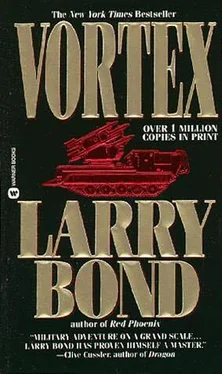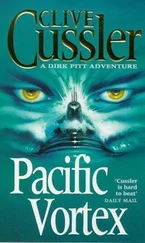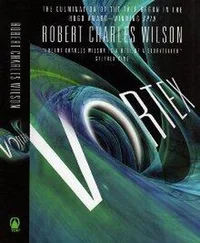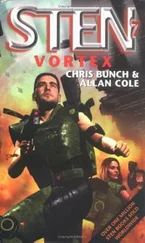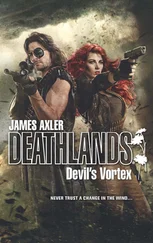“
Castro sat forward in his chair, his bushy eyebrows arched.
“Why only a single battalion? If Windhoek truly is their main objective, why don’t the South Africans apply more combat power there?”
Vega nodded to himself. A good question. Now, would the colonel falter, or could he answer to Castro’s satisfaction?
The intelligence officer passed his unspoken test.
“They cannot move more than a single battalion forward, Senor Presidente, because the road net north of Bergland isn’t able to support a larger force. Cramming more troops and vehicles into a narrower frontage would only make life easier for our gunners and antitank missile teams. “
Castro chuckled and waved Vasquez on.
The colonel moved his hand westward until it touched the coast.
“Our position at Walvis Bay is doubly secure. The only roads come from
Windhoek or across five hundred kilometers of unsettled wilderness. Any
South African force trying to recapture the port must either come by sea or take one of these roads. “
Vasquez shrugged, as though it made little difference.
“The support of our gallant Soviet allies guarantees us control of the sea route, and we now hold unquestioned air superiority over this section of the front. As a result, no South African column can approach without being detected and bombed into oblivion.”
Vega watched Castro’s smile grow wider and matched it with one of his own. Bombed into oblivion. Now there was
a wonderful image. He almost hoped Pretoria would be foolish enough to order such a doomed counterattack. Any venture that sucked more South African troops deeper into Namibia’s near-road less hinterland would make his job easier later on.
Vasquez turned his attention and that of his audience to the east.
“Our units defending Gobabis are less secure, because the town is surrounded by a net of villages and roads, but from Gobabis all roads lead to Windhoek.
And we hold Windhoek in strength. ” Heads nodded sagely across the room.
All were agreed on the strategic value of the capital.
Vasquez turned slightly, facing Castro and Vega squarely.
“To all intents and purposes, South Africa’s attempt to seize Namibia in a lightning campaign has failed. True, its soldiers occupy the southern half of this country, but we control areas containing more than two-thirds of the population and most of the mineral resources. In addition, sources report that South Africa’s losses have been much higher than expected. “
Vega noted that Vasquez left the other half of that equation carefully unspoken. Cuba’s own casualties had also been heavy.
Castro flicked cigar ash onto one of the Strand’s best china plates.
“So then, what can we expect the madmen in Pretoria to try next, Colonel?”
Vasquez smiled thinly.
“Barring commando attacks by small parties, an attack of any size must come north along Route One, directly from Rehoboth and Bergland. Given the existing logistical and strategic situation, we can see no other serious option for the South Africans. The Afrikaners can do nothing but continue to batter away at our mountain defenses-choking the road with their corpses and with their wrecked vehicles. ” He stepped away from the easel, signaling the end of his formal remarks.
Vega allowed himself a moment’s self-congratulation. Vasquez had done a good job. Clear, concise, and factual. And like all successful presentations, the colonel’s briefing had ended on just the right theatrical note.
Castro nodded his satisfaction and sat quietly for an instant,
wreathed in cigar smoke. Then he looked up.
“Tell me, Colonel, how much of the enemy’s force is committed to this war?”
Vasquez didn’t even consult his notes.
“We’ve identified units belonging to three brigades, Senor Presidente-half of South Africa’s regular army.
Counting reserves, more than a third of its national forces.”
Castro countered, “But Pretoria hasn’t fully mobilized its reserves yet.
True?”
Vasquez bowed his head slightly, acknowledging the point.
“Selected units are still being called up, Senor Presidente. “
Castro turned to Vega. His words were blunt. Tact wasn’t a social grace often found in absolute rulers.
“So, General, you have stopped this first assault, but the Afrikaners haven’t fully committed their reserves.” He leaned closer, his eyes cold and hard.
“I need to know, Antonio. Can you hold against a second, even larger, offensive?”
Vega had been expecting the question. It dovetailed perfectly into the proposal he hoped to make in a moment.
“I can, Presidente. With the two brigades now in Namibia, I can stop up to two South African divisions.
As you know, the defender has the advantage, three to one.”
“But by the same rule, you need more than a division yourself to advance against the South Africans. And the road net south will not support an offensive of that size.”
Vega was pleased. Castro’s preferred nickname was El Artillero or “The
Gunner. He had not lost his military skills. Inwardly, the general took a deep breath, thinking, now it begins.
“That is true. As matters stand now, we are deadlocked, Presidente. We can build up above two brigades, but Pretoria can also reinforce its army-leaving both sides caught in an escalating stalemate. Such a stalemate would continue until one side or the other was exhausted.”
Castro frowned and Vega frowned with him. Cuba could not win such a prolonged war of attrition. It was a poor country, without even a fraction of South Africa’s resources. Vega knew that national will counted, but he was a practical man and he always calculated the odds before making a bet. And staying locked into the current military situation was the
equivalent of staking one’s entire life savings on an already disqualified horse. His army’s capture of Walvis Bay had staved off defeat-not guaranteed victory.
Vega watched his leader’s face as he considered the options, knowing that
Castro was running through the same set of unpalatable choices he’d already considered and rejected.
Withdrawal was out. Too much of Cuba’s international prestige was already at stake. Havana’s support for little Namibia had garnered both praise from the world community and much-needed revenue from the country’s diamonds, gold, and uranium.
On the other hand, they couldn’t simply accept the status quo. Pretoria’s armed forces would eventually exhaust Vega and his men-wearing them down, man by man.
And that seemed to leave one equally futile and even more expensive option-a desperate race to match South Africa’s steady troop buildup. A race that would still inevitably end in eventual exhaustion and defeat.
Castro’s disappointed scowl grew deeper. He’d come to Namibia for a celebration and instead found the likelihood of ultimate failure.
Vega nodded soberly to himself. Cuba’s president had a good military background, but he clearly couldn’t see a way out of their box, either.
The general drew himself up straighter. it was time to take his own gamble.
He cleared his throat.
“I have a plan, sir-a good plan, I believe. But it involves a certain amount of risk.”
Castro looked up sharply.
“Risk of loss is better than certain loss.” He eyed his general closely.
“Tell me of this plan of yours, Antonio.”
Purposefully, Vega stood up and strode over to the easel.
“Senor
Presidente, I am convinced that we must look beyond the struggle for
Windhoek, or even for Namibia. This invasion is only the latest in a series of South African aggressions on this continent. It demonstrates once and for all that Pretoria’s racist government is incapable of reform.”
Читать дальше
